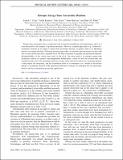Entropic Energy-Time Uncertainty Relation
Author(s)
Coles, Patrick J.; Katariya, Vishal; Lloyd, Seth; Marvian, Iman; Wilde, Mark M.
DownloadPhysRevLett.122.100401.pdf (261.2Kb)
PUBLISHER_POLICY
Publisher Policy
Article is made available in accordance with the publisher's policy and may be subject to US copyright law. Please refer to the publisher's site for terms of use.
Terms of use
Metadata
Show full item recordAbstract
Energy-time uncertainty plays an important role in quantum foundations and technologies, and it was even discussed by the founders of quantum mechanics. However, standard approaches (e.g., Robertson’s uncertainty relation) do not apply to energy-time uncertainty because, in general, there is no Hermitian operator associated with time. Following previous approaches, we quantify time uncertainty by how well one can read off the time from a quantum clock. We then use entropy to quantify the information-theoretic distinguishability of the various time states of the clock. Our main result is an entropic energy-time uncertainty relation for general time-independent Hamiltonians, stated for both the discrete-time and continuous-time cases. Our uncertainty relation is strong, in the sense that it allows for a quantum memory to help reduce the uncertainty, and this formulation leads us to reinterpret it as a bound on the relative entropy of asymmetry. Because of the operational relevance of entropy, we anticipate that our uncertainty relation will have information-processing applications.
Date issued
2019-03Department
Massachusetts Institute of Technology. Department of Mechanical Engineering; Massachusetts Institute of Technology. Research Laboratory of ElectronicsJournal
Physical Review Letters
Publisher
American Physical Society
Citation
Coles, Patrick J. et al. "Entropic Energy-Time Uncertainty Relation." Physical Review Letters 122, 10 (March 2019): 100401 © 2019 American Physical Society
Version: Final published version
ISSN
0031-9007
1079-7114